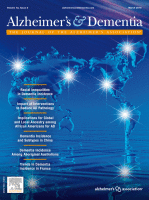Workgroup of Alzheimer’s Association National Plan Says Milestones Are Positive Step in Care and Support of Patients, Caregivers

New guidelines for Alzheimer’s disease patient care and caregiver support developed by the Alzheimer’s Association’s National Plan Care and Support  Milestone Workgroup are detailed in a paper, “Report on milestones for care and support under the U.S. National Plan to Address Alzheimer’s Disease,” published in the Alzheimer’s Association journal Alzheimer’s & Dementia.
Milestone Workgroup are detailed in a paper, “Report on milestones for care and support under the U.S. National Plan to Address Alzheimer’s Disease,” published in the Alzheimer’s Association journal Alzheimer’s & Dementia.
The Milestone Workgroup members and paper co-authors note that under the U.S. national Alzheimer’s plan, the National Institutes of Health identified three milestones, passage of which will be necessary in order to meet the plan’s biomedical research goal (goal 1).
However, similar milestones have not been created for the goals on care (goal 2) and support (goal 3).
Member of the workgroup are Malaz A. Boustani, Soo Borson, Kathleen C. Buckwalter, Louis D. Burgio, Joshua Chodosh, Richard H. Fortinsky, David R. Gifford, Lisa P. Gwyther, Mary Jane Koren, Joanne Lynn, Cheryl Phillips, Martha Roherty, Judah Ronch, Claudia Stahl, Lauren Rodgers, Hye Kim, Matthew Baumgart, and Angela Geiger.
 The Alzheimer’s Association workgroup includes members with expertise in clinical care, long-term services and support, dementia care and support research, and public policy. The workgroup reviewed the literature on Alzheimer’s care and support, investigating how other countries are addressing Alzheimer’s care and support issues, and have identified public policies that will be needed over the next 10 years to achieve a more ideal care and support system.
The Alzheimer’s Association workgroup includes members with expertise in clinical care, long-term services and support, dementia care and support research, and public policy. The workgroup reviewed the literature on Alzheimer’s care and support, investigating how other countries are addressing Alzheimer’s care and support issues, and have identified public policies that will be needed over the next 10 years to achieve a more ideal care and support system.
The workgroup developed and recommended 73 milestones for Goal 2 and 56 milestones for Goal 3, and said that to advance the U.S. national Alzheimer’s plan, the government should adopt these recommended milestones or develop similar ones to be incorporated into a national plan.
The authors observe that Alzheimer’s disease and other dementias are progressive, debilitating conditions that affect millions of Americans, their families, and federal and state governments, with total payments for care of people with Alzheimer’s and other dementias an estimated $226 billion in 2015, nearly 70 percent of which was paid by Medicare and Medicaid.
They estimate that barring a breakthrough in prevention or treatment, total costs of care will grow to an estimated $1 trillion in 2050, making Alzheimer’s and other dementias among the most costly medical conditions in the United States.
Perhaps even more daunting than the costs of care, the workgroup notes, is the burden on individuals and families. Over time, affected individuals become completely dependent on others, and underscoring this, about 15 million unpaid family members and friends provided over 17 billion hours of unpaid care in 2014. As more baby boomers reach the age of greater risk of developing Alzheimer’s, it can be expected that millions of them will spend their retirement years either living with the disease or caring for someone who has it.
Recognizing the significance of this growing crisis, the U.S. Department of Health and Human Services, under the auspices of the National Alzheimer’s Project Act (NAPA), created the National Plan to Address Alzheimer’s Disease, which was released in 2012 and has been updated annually. This National Plan aims to assist individuals and families affected by Alzheimer’s and other dementias by advancing research, enhancing care and support, and increasing collaboration across federal, state, and tribal governments.
Among the National Plan’s five goals, two specifically relate to care and support: Goal 2, “Enhance care quality and efficiency,” and Goal 3, “Expand supports for people living with Alzheimer’s disease and their families.” The paper’s authors note that the federal government has established a series of milestones required to meet the national plan’s first goal on research, which have been reviewed by independent experts. Still, it has yet to establish similar milestones on care and support, and that a list of actions that have been completed or are currently underway and are not analogous to the milestones created by the National Institutes of Health (NIH) to indicate what must be accomplished by 2025 to successfully attain the plan’s first goal regarding research on prevention and treatments.
To assist with the establishment of milestones for goals 2 and 3, the Alzheimer’s Association convened its expert workgroup to develop recommendations on a comprehensive set of milestones and timelines. Besides the workshop experts, external advisers, including representatives from federal agencies and experts in the fields of elder justice, dementia care, and public and private health systems, served as peer reviewers on the workgroup’s recommendations, providing input and making suggestions for improvement. The report outlines the workgroup’s activities and recommended milestones for adoption by HHS as part of the National Plan.
 Paper co-author and Regenstrief Institute investigator Malaz Boustani, M.D., MPH, associate director of the Indiana University Center for Aging Research and Richard M. Fairbanks Professor of Aging Research at Indiana University School of Medicine, is welcoming discussion of the workgroup’s recommendations.
Paper co-author and Regenstrief Institute investigator Malaz Boustani, M.D., MPH, associate director of the Indiana University Center for Aging Research and Richard M. Fairbanks Professor of Aging Research at Indiana University School of Medicine, is welcoming discussion of the workgroup’s recommendations.
Boustani hopes to improve the quality of the current healthcare system to accommodate the needs of patients with cognitive impairment in general, and those with dementia in particular. His research focus is on development of a multifaceted dementia care system across various healthcare settings including ambulatory, primary, and secondary care, hospital environment, and long-term care facilities. He is involved in various large projects aimed at identifying barriers to development of an enhanced system in primary care (PREVENT, PRISM-PC, and I-NEEDS studies), the hospital (PMD, e-CHAMP, 3Ds, and POCD projects), and in long-term care (ALFA and Dementia Care studies).
“Alzheimer’s takes a large toll on both individuals and family members who care for them,” said Boustani, who is also founder of the Center for Health Innovation and Implementation Science and developer of the Healthy Aging Brain Care model, which focuses on older adults with Alzheimer’s and other forms of dementia.
The Alzheimer’s and dementia paper authors conclude that although much work still needs to be done to achieve goals 2 and 3 of the National Plan by 2025, the workgroup believes the recommended milestones are a significant step toward changing how care and support is provided to people affected by Alzheimer’s disease and related dementias, including their families and caregivers.






